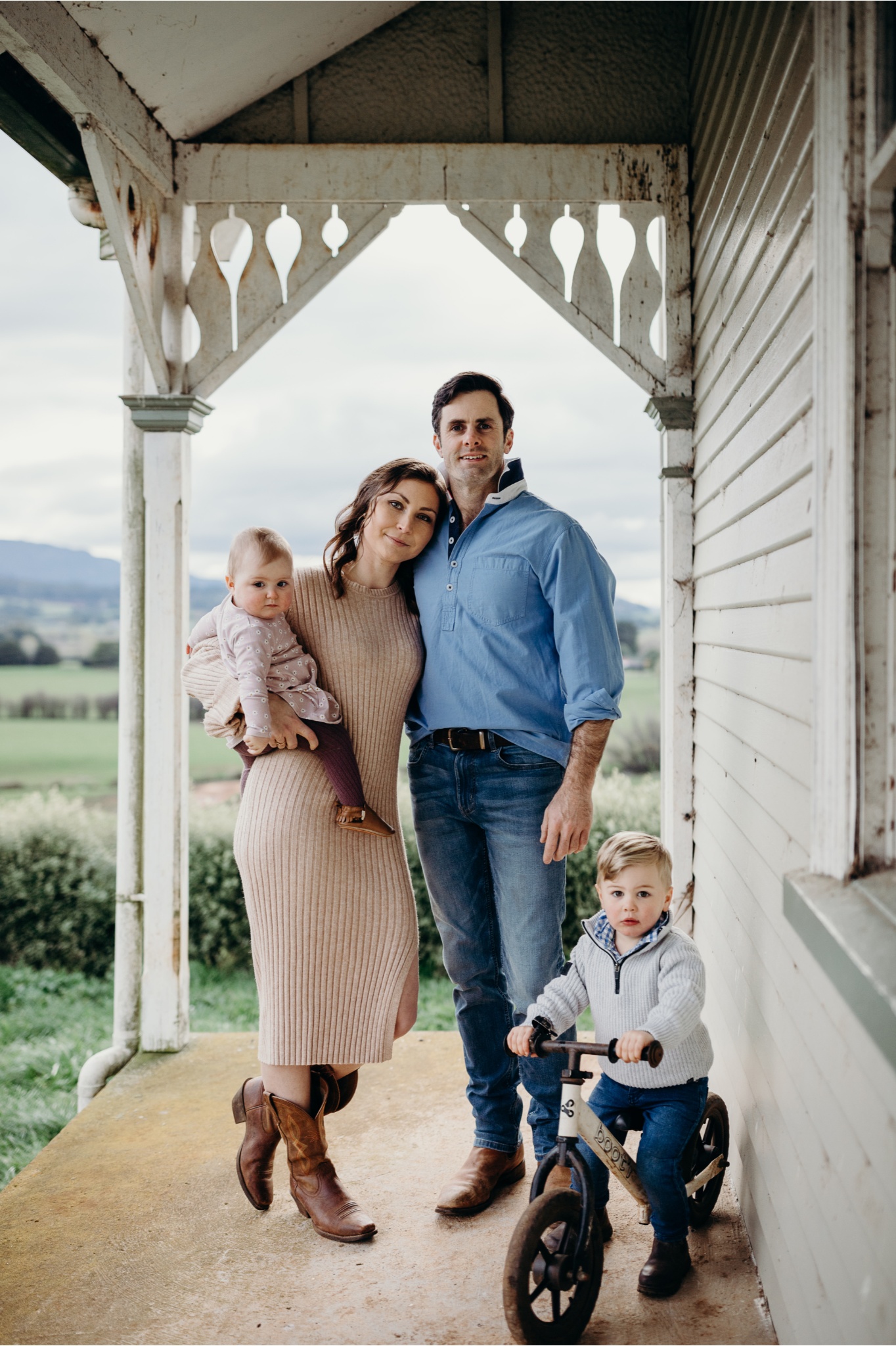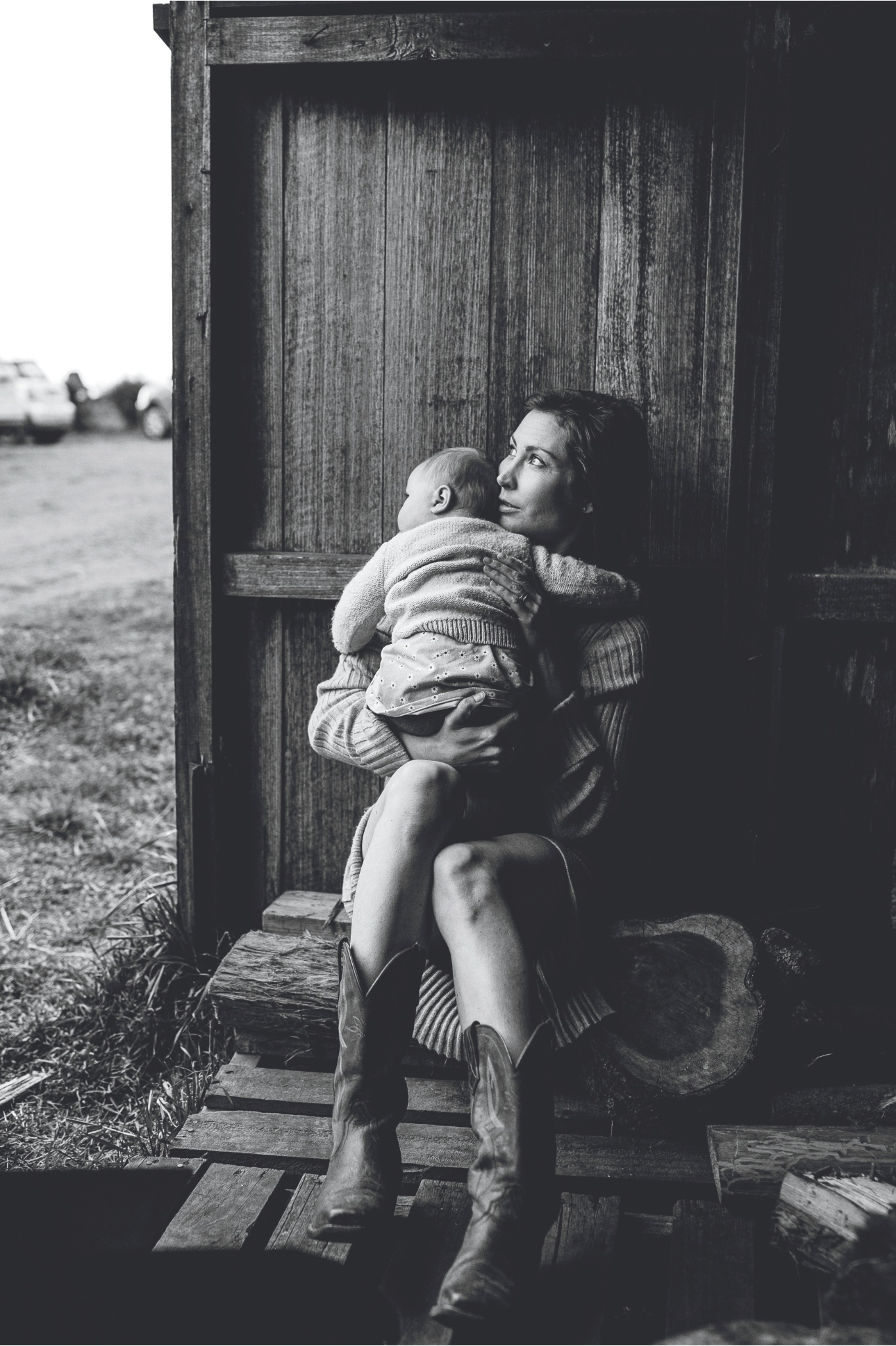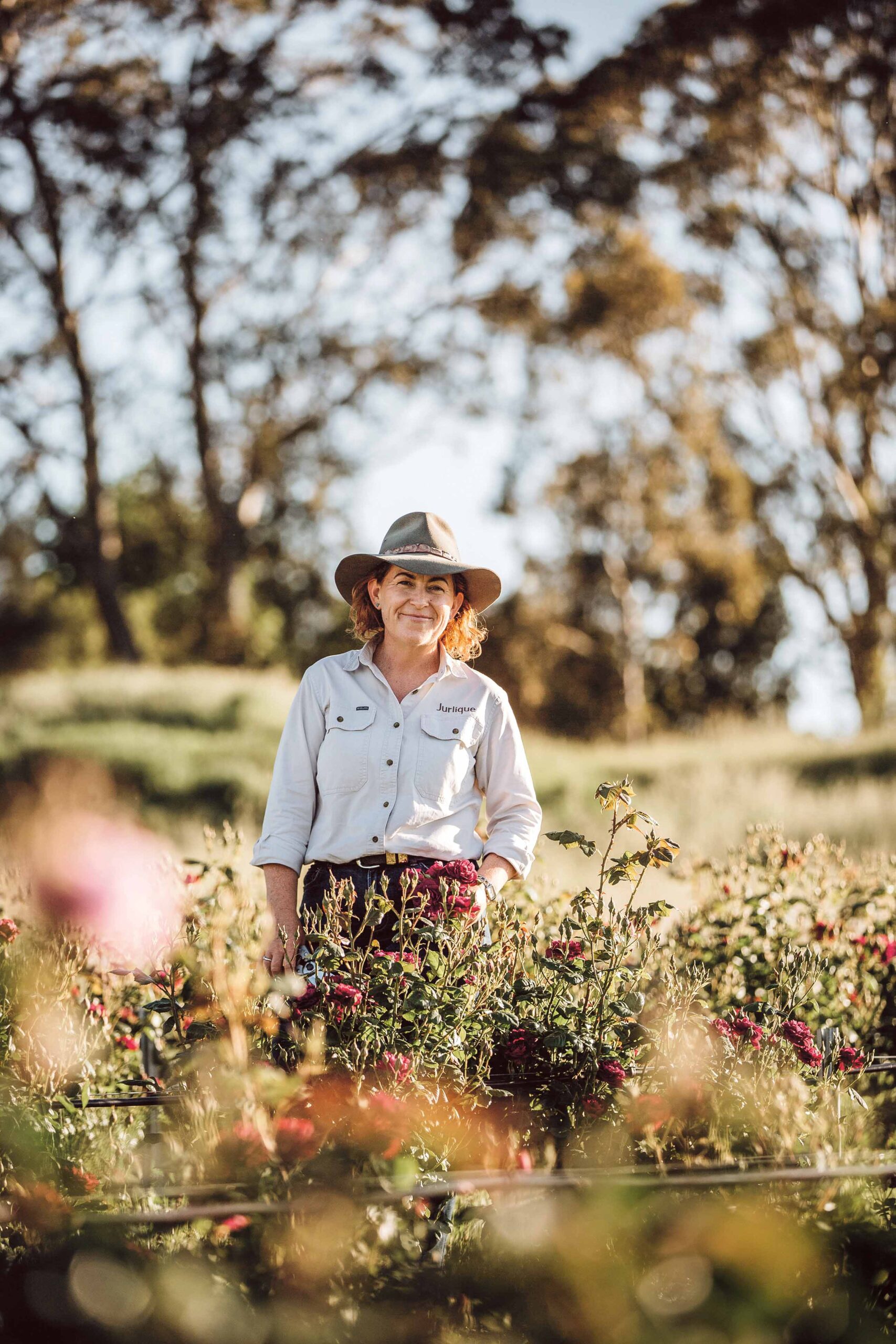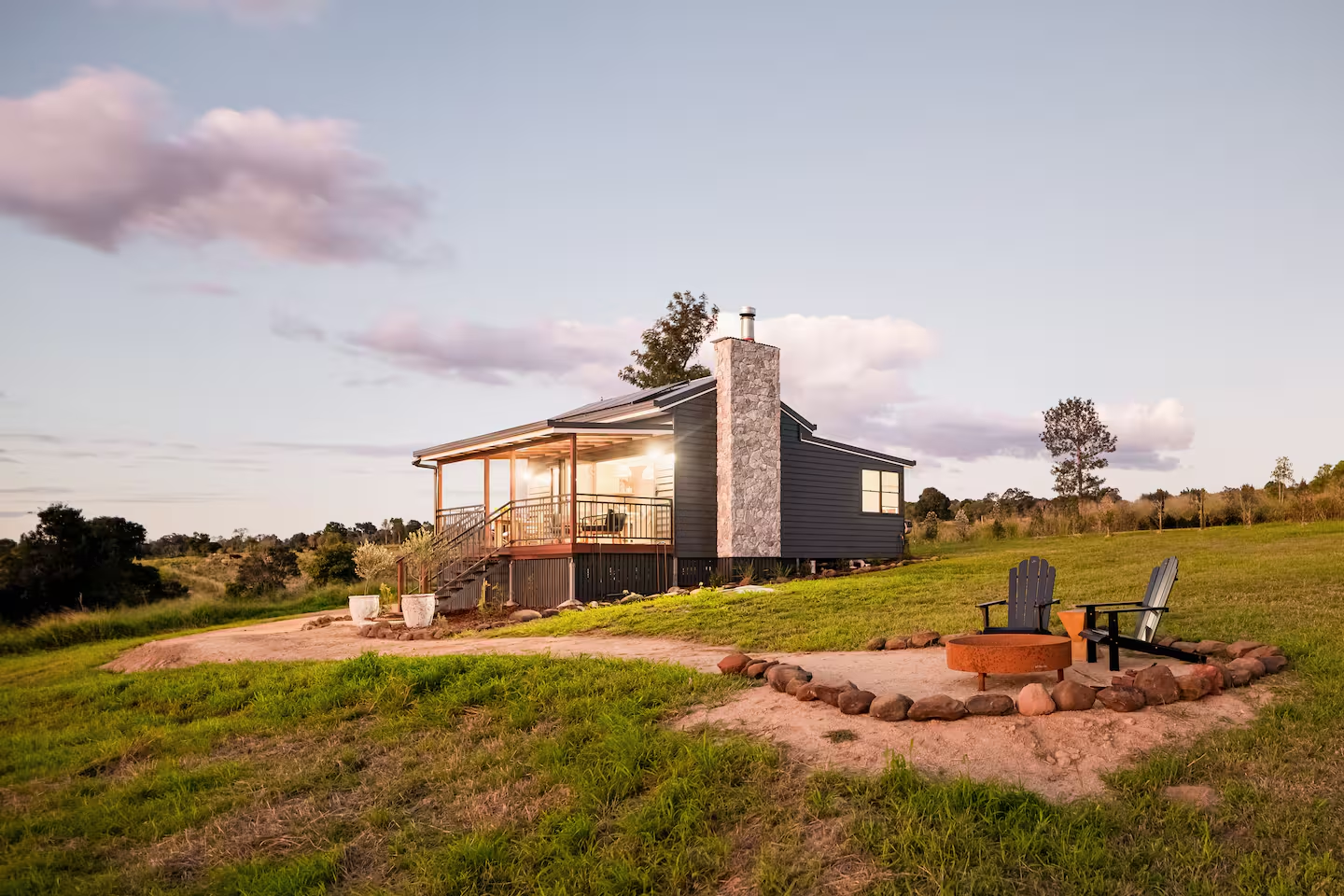Photography Pip Williams
Sign up to our mailing list for the best stories delivered to your inbox.
In 2019, the Tretheweys became the first Tasmanian farm to register a soil carbon project through Australia’s $2.5 billion Emissions Reduction Fund.
Words Emily Herbert Photography Pip Williams

Photography Pip Williams

Photography Pip Williams
Stephanie Trethewey has had many iterations in her 32 years: teenage professional tennis player; television reporter; communications and marketing specialist; now, a popular rural podcaster and, along with her husband Sam, a Tasmanian beef producer. Woven through these diverse roles are the bright threads of Steph’s personal traits: aptitude, determination and a deep understanding of the power of storytelling.
Steph and I chat at 8pm on a Tuesday night — I’m locked in my bedroom, hiding from my family, and she is in her office. It’s the only time that works between her busy schedule and mine; a common occurrence for the mum of two, her work orbiting around the needs of her son Elliot, two and a half, and 10-month-old daughter Evie.
“Every day is so different. It’s running around like a headless chook, trying to get life done in between naps and tantrums,” she says. “I’m just making it work, like every other mum does.”
When the babies go to sleep, Steph’s other work begins. Evenings are for interviewing guests and editing conversations for Motherland — a podcast dedicated to shining a light on the lives of rural mums. Marking its two-year anniversary this December, the podcast has ticked over more than 100 interviews with women raising their families in the bush.
“I didn’t have any friends or family when we moved here. My career options were pretty limited outside the business, I had a baby and I felt isolated. I couldn’t find a platform that was dedicated to rural mums, so I created my own,” she says. “I’ve gained a lot of confidence from listening to other mums’ stories and realising there is no ‘right’ way to mother on the land. Whatever you do, it’s the right decision.”
Growing up as an only child, Steph homeschooled herself through years 11 and 12 via distance education, while on the professional circuit as a tennis player. At a formative time when identities and values are cemented, Steph’s innate tenacity and determination were ingrained — attributes that serve her well today. “I’m still a perfectionist and I expect a lot of myself, and those expectations aren’t always helpful,” she says. “But I get shit done. I’m very passionate and purpose-driven.”
The Tretheweys moved from Melbourne back to Sam’s home state of Tasmania in July 2019, the decidedly English tapestry of verdant pasture and hedgerows of frothy hawthorn a stark contrast to Steph’s childhood in Sydney’s eastern suburbs. Moving to a property 15 minutes out of the historic riverside village of Deloraine in Tasmania’s central north, Steph had a six-month-old and a naïve idea of what it meant to farm.
“Even though I didn’t grow up on the land, the rat race got to me. I felt depleted and it was time for a change,” she says. “I’d watched a lot of episodes of Gourmet Farmer and River Cottage which are the worst things to watch because that’s not the reality of living on the land. But we both craved connection to our food and ourselves. It was time for us to run our own show.”
It was a long road to get there. The pair had met six years prior in Rockhampton, in a chance encounter that a fatalist would say was meant to be. Steph was working locally as a reporter for Seven News, while Sam was in town as a guest speaker at an ag conference. An interview on a slow-news day was a fork in the road of both their lives.
“It would’ve taken one car accident, one politician in town, one announcement from council, for me to pursue a different story,” Steph muses. “A lot of things could have happened that day and they didn’t.”
Growing up on the land and working across a swathe of food and fibre operations — from crocodile to cotton — Sam went on to work in the agtech and agribusiness space in the city for four years, before the couple made their move across the ditch. They had the vision and the passion — but no farm and no money.
Listen to Step on Graziher’s Life on the Land podcast. Article continues below.
“We found an amazing loan for young farmers through the Tasmanian government, which basically backed us into the property at a really low interest rate. We also took on an investor to help us from an operational side. Since then, Sam’s dad has bought the investor out, so we’re now 100 per cent family owned,” Steph explains. “Breeding units are incredibly expensive and we didn’t have the capital. Sam’s startup genius came to the fore. I remember him saying, ‘Uber is the biggest transport company in the world and they don’t own a single car. Airbnb is the biggest accommodation company and they don’t own a bed. How can we own a beef business without owning a cow?’”
The answer is uniquely simple. The Tretheweys started a Red Wagyu bull stud, forming partnerships with Tasmanian dairies. The couple stud their bulls to the dairies, buying back the first-cross calves to grow out to kill weight. Not even three years down the line, they own two farms and lease a third; running more than 2000 head across 600 hectares.
“We’re still doing that now as well as breeding our own cattle. People often say, ‘Your business looks great, your social media looks great’ and it is — but humble beginnings doesn’t even begin to describe it. It has been a grind.”
In February the operation became vertically integrated, selling its beef under the brand Tasmanian Agricultural Company (Tas Ag Co). Stocked at gourmet butchers and premium grocers across the state, there’s been growing demand from the mainland — with an increasingly savvy environment and provenance–obsessed consumer.
“We really want to build a brand that people can fall in love with and get to know and trust. I used to get very self-conscious that I’m not from a farming background,” Steph says.
“I think a lot of rural women don’t take ownership of how important their role is in a food business, whether you’re in the yards or not. There’s that element of imposter syndrome. But the reality is, it’s my space now too.
“I bring something different to the table, and owning that is a powerful thing. I’m trying to bring my passion for good storytelling and apply that to the business and carve out my own role in Tas Ag Co. People really do like that they can trace our beef back to us.”
Part of Tas Ag Co’s story is its regenerative roots. In 2019, it was the first Tasmanian farm to register a soil carbon project through Australia’s $2.5 billion Emissions Reduction Fund. Aiming to sequester more carbon than they emit, the Tretheweys regularly measure the soil carbon a metre underground, at 18 scattered locations across their properties; tracking the data in a protocol that is eligible under the United Nations Paris Agreement.
Tas Ag Co is also focused on biodiversity, rotational grazing on pasture nicknamed ‘salad bowl paddocks’, boasting up to 30 different plants such as turnips, radishes, peas and sunflowers. These multispecies crops draw carbon into the soil, while improving the soil’s microbiology and providing the cattle with a nutritional boost. Now Tas Ag Co is going beyond beef, looking to add chickens to the rotation and eggs to the brand.
“We don’t know anything about eggs or chickens and we don’t really need to — we’re looking at turning Tas Ag Co into a local brand that enables new talent to grow with us,” Steph says. “We’re playing to our strengths. We are who we are and we’re trying to tell our story as authentically as possible. The reality is, we’re a young couple in love, raising our babies and having a crack. And we’re only just getting started.”
For information, visit tasagco.com.au and motherlandaustralia.com.au
Subscribe to Graziher and never miss an issue of your favourite magazine! Already a subscriber? You can gift a subscription to someone special in your life.
To hear more extraordinary stories about women living in rural and regional Australia, listen to our podcast Life on the Land on Apple Podcasts, Spotify and all major podcast platforms.

Raised on a dairy farm near Hahndorf, SA, farm manager Cherie Hutchinson has a deep love for the land she works on.

If you like the idea of a private plunge pool, mountain views and a glass of local verdelho, it’s time to start planning your Firebreak Farm escape.